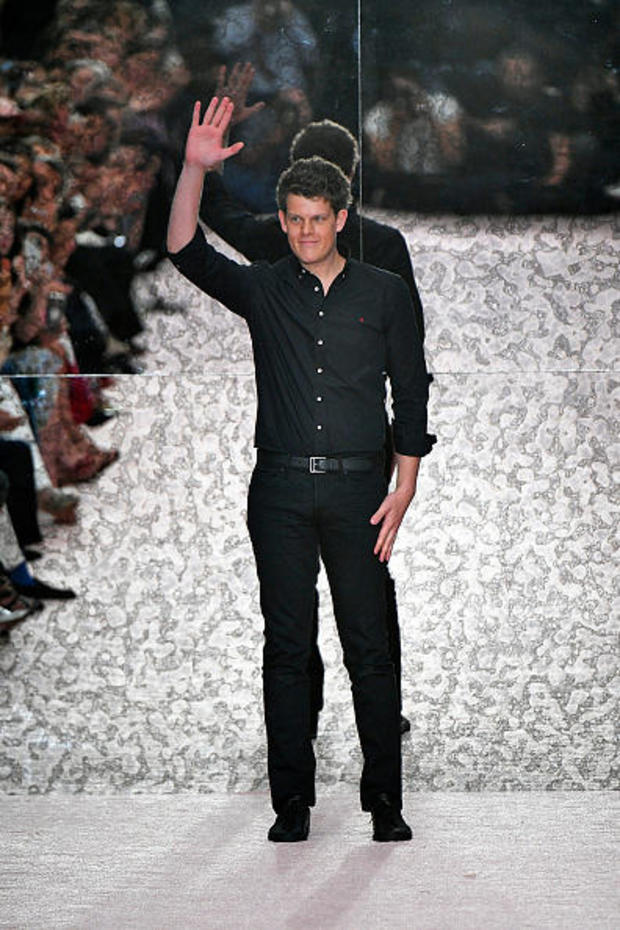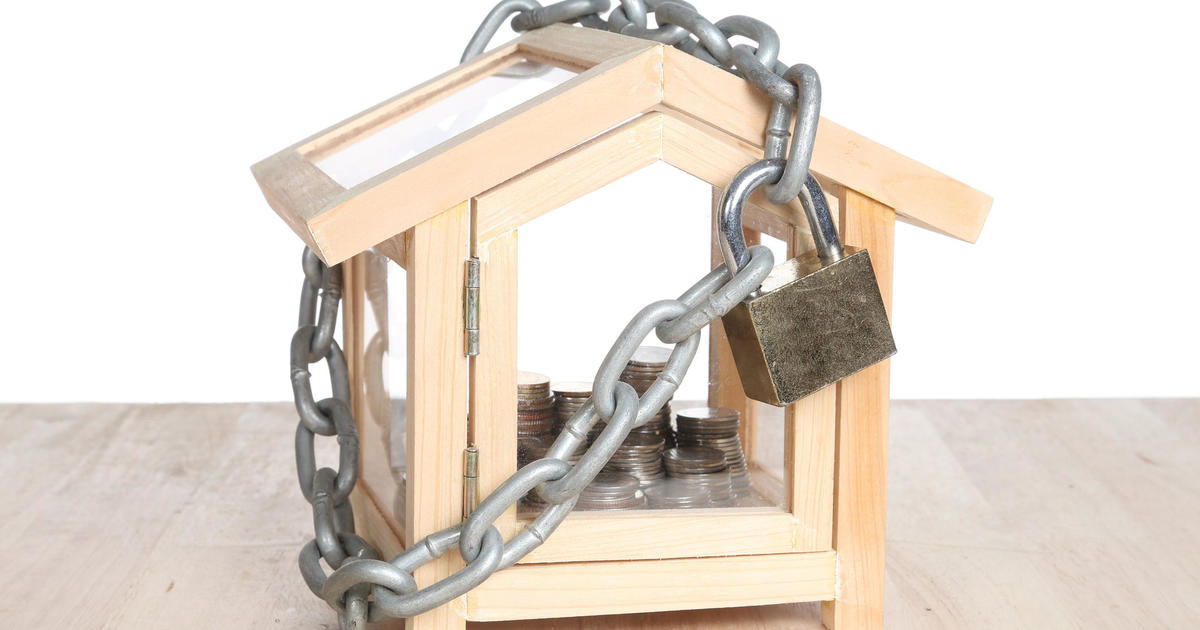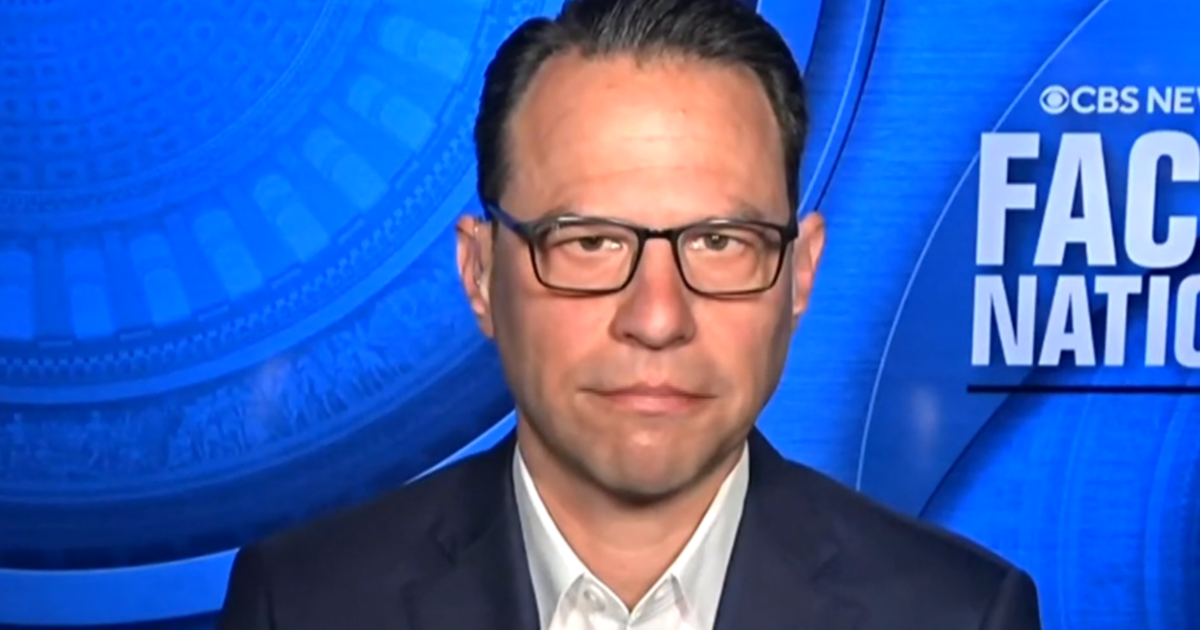Wes Gordon, Carolina Herrera creative director, on fashion post-pandemic
In this episode of Facing Forward, Margaret Brennan talks to Wes Gordon, Creative Director of Carolina Herrera, to discuss what the post-pandemic fashion industry will look like.
Highlights
- On what changes the fashion house made to reflect the pandemic economy: "The first decision we made was to reduce the size of the collection. And that greatly influenced the way I design. My goal is always to give a woman something that's glamorous and exciting and takes your breath away and makes your heartbeat a little bit faster. But now I wanted to do that with an added layer of comfort and ease and wearability. And by having a tighter collection offering, I really need to make sure that each piece we're creating serves all of those purposes."
- On scrutiny of women in fashion: "I think clothes are incredibly powerful and what people wear can convey so much and there can be so many levels of meaning and communication about what a man or woman is wearing and how he or she is presenting themselves. And I don't think it's that we over-scrutinize women, perhaps it's that we don't discuss enough the symbolism of what men are wearing and that we should be a little more equal in that because we have a tendency not to talk about the men, but really only focus on the women--and there are extraordinary communication messages that happens in- that happen in a man's wardrobe as well. And then so- so talk about fashion, I think. You know, I think it's OK to- to discuss what was the symbolism of the White when Vice President Harris took that stage. I think these are important things. And I don't think in any way, shape or form that's a negative conversation. But don't just do it for the women, you know, I think do it for everyone, be equal about it."
- On markets seeing a surge in fashion post-pandemic: "We absolutely saw a correlation, you know, between geography and- and sales numbers, particularly in North America. The regions that, as you pointed out, were less locked down and were opening earlier, we saw those- the spending habits and the retail activity accelerate much more quickly."
Download, rate and subscribe here: Apple Podcasts, Spotify and Stitcher
"Facing Forward": Wes Gordon
Producers: Richard Escobedo, Anne Hsu, Kelsey Micklas
MARGARET BRENNAN: Wes Gordon, welcome to the pod.
WES GORDON: Thank you, MARGARET. I am delighted to be here. It's an honor and privilege to be chatting with you.
MARGARET BRENNAN: Well, I think it's fun- you know, one of the things that people may or may not know is my first official beat as a cub reporter was covering consumer and the retail business. And one of the reasons why I liked it so much is, you know, consumer spending is 70% of economic activity in this country. So it's a huge part of the economy. But fashion and parts of it are also kind of the more fun, artistic expression of these, like, moments in time. They kind of give windows, I think, into how people are experiencing things, how comfortable they are spending, what they want to look like. And we've just gone through this incredible period of time. I'm wondering, coming into this spring, this has been a really long, tough period. What are you looking for for inspiration these days?
GORDON: I love everything you just said. I think the way you just summarized the fashion industry, I think is so beautiful, because in addition to being a reflection of what people are feeling in a moment in time, fashion is also an insight into what people are dreaming and what their hopes are for the future and their level of optimism about what lies around the corner. And all of those things, I think, are- are what we're witnessing and focusing on right now. The past year was extraordinary, horrible, you know, knock on wood, fingers crossed, something we will never live through again, but we certainly learned a lot from it. And how I design changed over the past year in many ways. But in answer to a question right now, sitting here in my office sketching, I'm focused on the magic that our women are looking forward to, again, coming out of- of the darkness.
MARGARET BRENNAN: I love that, coming out of the darkness. Well, so- so what is it we're all going to be sort of aspiring for? How is it that you are visualizing what's to come in?
GORDON: I think what we're all aspiring for are the very essence of our humanity, you know, laughter, togetherness, family, joy, love, all the things that we've been de- deprived of in so many ways over the past year. You know, it's- it's- it's those things that make us human, and it's not in our nature to live 24/7 in fear and- and sadness and isolation. Right now, you know, everyone's excited about getting back to life, getting back to being humans, it's getting back to their friends, their families, celebrations that were postponed, a summer of joy.
MARGARET BRENNAN: So does that mean, like, long hair and long beards, those are all going to get shaved and cut? I mean, are people going to drop their sneakers and put on their stilettos?
GORDON: Listen, it's not that black and white, because I think what happened over the past year wasn't just a surrender, right? It wasn't that we all just stopped caring about how we looked. I think in many instances people did a lot of soul searching and better understood what makes them unique and who they really are. So I think, I hope, that there are some expressions of individuality and uniqueness that will remain. But I certainly think that in instances where people maybe stop making the effort, we will see- we will see that resume.
MARGARET BRENNAN: So I read that you cannot keep evening gowns in stock. How is that possible? Who is wearing an evening gown in America right now and where are they wearing it to?
GORDON: So it's- it's been an incredible thing, and one of the great signs of optimism for me is when I see this data. You know, it's not just the idea of an evening gown. It's- it's celebration clothes and the clothes that mark those milestone moments and occasions. And you have to remember that for 12 months, so many events and celebrations had to be put on hold, weddings in particular, birthdays, anniversaries. So, of course, the format of those occasions has changed. It's no longer big groups of hundreds. It's smaller. It's more intimate. But in no ways has that minimized the importance of those occasions and those celebrations, and a woman still wants that dress that makes her feel her most beautiful and empowered to mark that day with.
MARGARET BRENNAN: So the hottest markets I read were Florida and Texas for you. Is that- I mean, these are two states that opened early. They really kind of shirked some of the health restrictions that the rest of the country did. Does that mean, like, that's just where events were being held, therefore, that's where sales were taking place?
GORDON: We absolutely saw a- a correlation, you know, between geography and- and sales numbers, particularly in North America. The regions that, as you pointed out, were- were less locked down and were opening earlier, we saw those- the spending habits and the retail activity accelerate much more quickly. Right now, at this point in time, you know, I'm sitting here in New York and New York State is doing a very good job with vaccinations. There's definitely an optimism on the sidewalks. It's- the weather's beautiful. So we're seeing those numbers, that- that improvement certainly work its way north. But, yes, we saw our first signs of life, let's say, in the southeast.
MARGARET BRENNAN: Do you think that from what you're seeing now and what customers are buying, that that signals were like around the corner from this Roaring Twenties moment where it's just going to go super glam to swing back from pandemic sweatpants wearing?
GORDON: I want to see all the people I haven't seen for the past year. I want to have dinner with my friends. I want to have drinks with my friends. I want to dance. I want to celebrate. I want to have a great time. And I think there are so many people who are in that same boat. You know, it's been- it's been a terrible year, and we're all so lucky to- to, you know, that what we're complaining about is that we were isolated and sad and that we kept our health and- and survived it. But it's- we all want fun right now and color and joy and dancing. We're a brand about embracing life and treating every moment as a celebration and and being grateful for the here and the now and the people you're with and your family, and I think that's never been truer than- than right now.
MARGARET BRENNAN: So you've had a pretty remarkable career. You worked with Tom Ford, Oscar de la Renta, you took the reins at this house, Carolina Herrera, about two and a half years ago. You're only 34 years old. That's pretty incredible.
GORDON: Thank you. I mean, I went to design school and then as soon as I graduated, I started a small collection and did that for nearly eight years and then had the great fortune of coming to Herrera to consult. And it was right around the time that Mrs. Herrera was stepping down from her role. And I became creative director. So I feel incredibly fortunate to have identified at an early age what it is that that brings me joy and what I feel passionate about, and then to have had, you know, supportive parents and opportunities to- to kind of make that a reality.
MARGARET BRENNAN: But it's an incredible time to try to also keep a business going. Right? I mean, we had a really horrific contraction in the economy this time last year.
GORDON: Yes.
MARGARET BRENNAN: We saw big bankruptcies of big names and layoffs across major brands. What was that like for you? Did you feel, at a point that- that this was coming to an end?
GORDON: I never felt it was coming to an end in the sense that I am the most aggressively half glass- glass half-full person you'll ever meet. I'm very optimistic. But there were very trying moments throughout the past year, and we- I, you know, the president of Herrera, Emilie Rubinfeld, is an incredible leader and did a brilliant job navigating us through it. We're incredibly grateful to have a parent company, Puig, which is a remarkable group of people. And I think, you know, we did what- what many businesses at the time were doing, which is trying to simultaneously adjust for that immediate moment and also plan ahead, because if you focus too much on that immediate moment and kind of went too far into survival mode, you know, it's going to make it more challenging, I think, to- to resume activity quickly, which is what we all need to be doing right now.
MARGARET BRENNAN: You said you learned a lot over the past year and, like, changed some of what you were doing. Like what do you mean by that? What- what changes do you think are going to stay with you?
GORDON: The first decision we made was to reduce the size of the collection. And that greatly influenced the way I design. My goal is always to give a woman something that's glamorous and exciting and takes your breath away and makes your heartbeat a little bit faster. But now I wanted to do that with an added layer of comfort and ease and wearability. And by having a tighter collection offering, I really need to make sure that each piece we're creating serves all of those purposes. So rather than having a beautiful cotton shirt and a fabulous, over-the-top cocktail dress, can I fuse the two of them? Can I take the versatility and ease and, you know, kind of sportswear chic of the shirt with that magic and spice of the cocktail dress and kind of morph them into one product that- that a woman is able to wear many times and always feel great and maintain that comfort and lifestyle component that she's become so accustomed to over the past year. So that's something that has definitely been a learning from the past year, a fantastic improvement to our business, I think a more focused articulation to our clients of my design vision and something that we absolutely will be carrying forward.
MARGARET BRENNAN: OK, Wes, stay with us. We're going to take a quick break.
(BREAK/SOUNDBITE)
MARGARET BRENNAN: So that was Kamala Harris giving the victory speech, becoming the first woman Vice President of the United States, and you dressed her for that speech. What was that like?
GORDON: I mean, I just- just hearing that sound bite. How cool was that moment? I- I, for one, will never forget watching that. And- and it's not just because she was wearing a suit that I designed. It was just because it was an extraordinary moment to be an American, to be a human, and I had the great opportunity to- to play a tiny, tiny part in that evening by making her a Carolina Herrera suit and blouse, and Vice President Harris has- frequently now wears Herrera suits, which is so exciting to me. And it's just- you know, in a year of a lot of sadness and darkness, that evening was so extraordinary.
MARGARET BRENNAN: Well, it was a historic moment. I mean, tell me, what was the image you thought you were helping to project?
GORDON: You know, I- I was incredibly lucky to have met Vice President Harris, and I will say that there are very few people you encounter, and you can probably agree who when you become accustomed with their media image and their social media image and the idea of that person, very often reality is a letdown, unfortunately. And in the case of Vice President Harris she's even cooler and more brilliant and more amazing and more spectacular and more inspiring in person than you possibly could imagine her to be. So I was so excited at the prospect of creating that shell and that wardrobe and that outer expression of her inner super powers, and that's really how I thought of it. You know, it wasn't- it was just about what's going to make her feel like the best version of herself on this extraordinary night for humanity.
MARGARET BRENNAN: There's a lot of scrutiny about- over what women wear, right? And unfairly women in the public eye. I mean, I- I get it. I- I get the incoming myself just being on television. But like, do you feel as someone who is helping to craft presentation for women at one of the top fashion houses in the country, do you feel responsibility in that, in like how you set trends, and how you source things that you have to somehow become either protective of the women you're dressing, but also of the industry that you're representing. You know, there's so much scrutiny these days over environmentally conscious sourcing and things like that. How much of that do you actually digest when you sit down and design?
GORDON: I think, starting with the- the scrutiny level and what's appropriate and what's OK of women in the spotlight and powerful women in particular at this moment in time where we have the second-highest office in the nation occupied by a female. I think that's a really valid question to ask is what's OK and what's not OK to talk about when it comes to fashion?
MARGARET BRENNAN: Mhm.
GORDON: And Dr. Jill Biden has taken a particular stance right now about not- not wanting the focus to be on what she's wearing and something really important that I believe is, number one, it's up to the woman herself how much she wants to talk about what she's wearing or not. That's every woman's choice. That's every first lady's choice. And I think we should respect that. That said, I'm- I'm biased, I work in fashion. I think clothes are incredibly powerful and what people wear can convey so much and there can be so many levels of meaning and communication about what a man or woman is wearing and how he or she is presenting themself. And I don't think it's that- that we over-scrutinize women, perhaps it's that we don't discuss enough the symbolism of what men are wearing and that we should be a little more equal in that because we have a tendency not to talk about the men, but really only focus on the women--
MARGARET BRENNAN: Mhm.
GORDON: --and there are extraordinary communication messages that happens in- that happen in a man's wardrobe as well. And then so- so talk about fashion, I think. You know, I think it's OK to- to discuss what was the symbolism of the White when Vice President Harris took that stage. I think these are important things. And I don't think in any way, shape or form that's a negative conversation. But don't just do it for the women, you know, I think do it for everyone, be equal about it. So that was kind of the first part of that.
MARGARET BRENNAN: Yeah.
GORDON: Then the next one about, do I feel a responsibility for- for operating with integrity, let's call it, and- and- absolutely. I'm enormously concerned about the climate crisis and global warming and- all- and- and- unfair treatment of- of workers around the world and all of these things right now that are directly affected by the fashion industry and that are issues that we're seeing already the consequences of. So it's critically important to everyone at Herrera that we be the best global citizens possible and that we make a product that represents beauty and joy and celebration and life and color, inside and out.
MARGARET BRENNAN: Do you feel that that- you said that was like your own internal pressure, but like, do you feel like there's pressure in the market from people who are out and shopping? I mean, how much do people actually think about that? Like- like you said, there isn't a lot of scrutiny of men. Like I haven't heard many people worry about whether Joe Biden's tie was made by a environmentally sustainable line or a responsible manufacturer. Like it's- it's really kind of pick and choose when people seem to put that weight behind it.
GORDON: Absolutely, I- I absolutely agree. You don't see that same level of analysis and scrutiny. And you should, because, you know, there's- there's an equal impact from those decisions in terms of the consumer, what they care about and do they care? Had you asked me that, say, three years ago, I would have had a very different answer. Right now, the consumer cares definitely more than ever.I think the idea of sustainability in textiles and fashion has very quickly gone from being kind of a fringe concept to something that is on the top of everyone's minds, whether they're designers or consumers or fashion executives or retailers, and that's great. And we're seeing just- just from my end and internally the rate of acceleration that fabric mills are quickly now offering, you know, maybe they would have had two or three out of a thousand fabrics previously available sustainably with organic cotton or with a sustainable finish. Now, suddenly we're seeing that's gone up several thousand percent. I mean, now we have dozens and dozens of options from each mill of sustainable fabrics. And you're only seeing that because there's that consumer demand. So it's definitely a real thing. And, you know, I- I think was heightened and expedited by the experiences of the past year. And is another great example of something I hope remains people looking for integrity and purpose in the products that they buy and the pieces they bring into their lives.
MARGARET BRENNAN: What is- what do you mean by sustainable? You said organics, is- is that--
GORDON: So--
MARGARET BRENNAN: What does that mean?
GORDON: Yeah, sustainable is complicated because textiles are made up from so many different components. Right. So we have viscoses. We have silks. We have cottons, wools. And the criteria and classification for what makes each of those different fibers. Be deemed sustainable varies tremendously and how you measure whether something sustainable varies tremendously. Are you talking about it being sustainable because the cotton in the dress was organic or you talking about it being sustainable because it was, you know, included in a bulk shipment rather than shipped piecemeal with more carbon footprint? So there are- there's so many different levers and- and mechanisms for labeling something sustainable.
MARGARET BRENNAN: Mhm.
GORDON: And it's very gray at the moment, I would say. But what matters is that people are trying and I really do believe that they are. And it's- it's- it's thanks to some designers who kind of really stuck their neck out there in the past and were saying that this was something that was possible and they believed in that now the entire industry, I think, is really understanding that this can work, that- that you can make a beautiful product and it doesn't have to be, you know, bad for the world, let's say. And you're as a result, you're seeing tremendous change happening very quickly.
MARGARET BRENNAN: So I want to end with kind of a fun prediction, if you can give it to us.
GORDON: OK. OK.
MARGARET BRENNAN: So everyone wants to know what normal is going to look like. What do you think Fall Fashion Week will be like? Will we be back in-person and gathering?
GORDON: OK, I don't have a crystal ball, but I'm going to tell you what I hope is the case. I hope that come September for Fall Fashion Week, which will be Herrera's fortieth year of New York Fashion Week. I hope that we are presenting a live fashion show. I imagine it will be to a smaller group than it was in the past. Last February, so a year ago from February, we did a fashion show with nearly 800 people in the audience.
MARGARET BRENNAN: Wow.
GORDON: So do I think we'll be doing that in September? Absolutely not. But am I hoping for, let's say, 50 to 200 people, you know, very safely assembled? Yes, because there is a magic to a fashion show that I miss. The industry as a whole has come up with so many creative, exciting ways to tell fashion stories over the past year, digitally on social media, with video, with photography. But that in-person experience and seeing the clothes and sharing with people, the clothes in person and the models and the music and the hair and the entire ambience, there's a magic to it. And New York Fashion Week is- is that goosebump moment that American designers love, and it's something that I think is- is we should all, as Americans, be proud of and hoping to return to.
MARGARET BRENNAN: Wes, thank you so much for your time. Fun talking to you.
GORDON: Thank you. So fun talking to you as well. I really appreciate it. And this has been a- this has been a blast.




